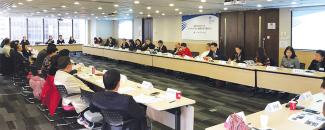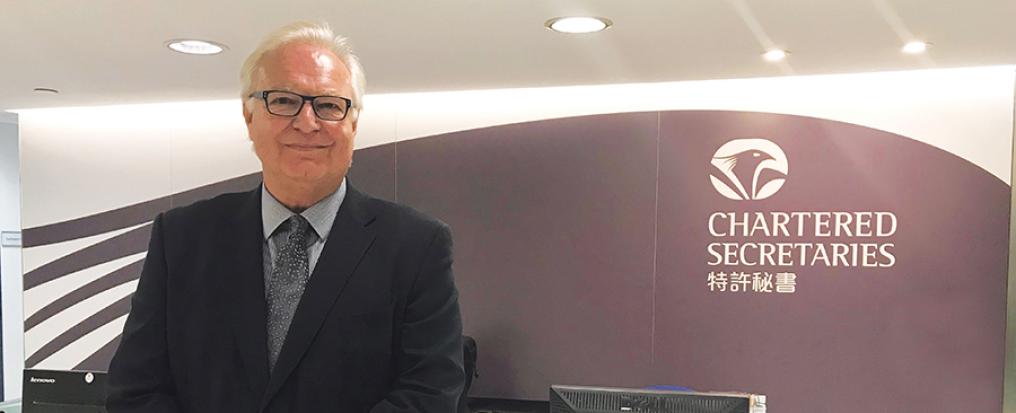Heightened expectations and liabilities for directors and senior executives working for companies in Hong Kong and Mainland China was the focus of the Institute’s latest Company Secretary/Board Secretary Roundtable meeting.
The Institute holds five Company Secretary/Board Secretary Roundtable meetings every year in Hong Kong and cities in Mainland China. These forums are designed to assist Institute members and Affiliated Persons from both the Mainland and Hong Kong to keep up to date with the fast-changing regulatory environment in which they work. The latest Roundtable, held on 18 January in Hong Kong, focused on the theme ‘The Board Secretary Practices under the Tightened Regulations on Directors and Senior Management’.
Institute President David Fu FCIS FCS(PE) gave the welcoming address, reiterating the Institute’s commitment to the continuous promotion of best corporate governance practices and training of professional company secretaries as both the quantity and quality of listed companies, particularly those from the Mainland, continue to rise. He was followed to the podium by two distinguished speakers who shared their insights and experience with board secretaries representing various Mainland companies listed in China and/or Hong Kong SAR.
The first speaker, Poon Chiu-kwok FCIS FCS(PE), Executive Director, Vice-President and Company Secretary of Huabao International Holdings Ltd, who is also a member of the Institute's Professional Development Committee, talked about the latest rules and regulations regarding directors’ and senior executives’ liabilities, as well as the tougher approach to listed company misfeasance taken by regulators in Hong Kong.
His presentation was followed by that of Zhu Xu, Board Secretary at China Vanke Co Ltd, who shared with the audience her recommendations on how to ensure directors perform their duties to the best of their abilities and in compliance with applicable rules and regulations. She also discussed the benefits and challenges of Vanke’s decentralised ownership structure.
Listing regime reform in Hong Kong
In 2015, Hong Kong turned down a proposed bid by e-commerce giant Alibaba to list in Hong Kong with a voting structure for board nominations that would have violated the one-share-one-vote principle. Alibaba eventually opted to list in New York, depriving, Mr Poon pointed out in his Roundtable presentation, Hong Kong investors of an opportunity to buy into the company.
'The dual-class structure, whether it’s for better or worse, proposed by Alibaba and increasingly other "new economy" firms has been an ongoing debate. But that has become a catalyst for review and change, which is now driving a change in Hong Kong’s listing regulatory regime,' he said.
After months of debate and an industry-wide consultation, Hong Kong Exchanges and Clearing Ltd (HKEX) and its subsidiary The Stock Exchange of Hong Kong Ltd proposes to add two new chapters to the Main Board Listing Rules to allow the listing of:
- biotech issuers that are pre-profit and/or pre-revenue, and
- issuers from emerging and innovative sectors that have weighted voting rights (WVR) structures, subject to additional disclosure and safeguards.
Companies with WVR structures would be required to have a minimum expected market capitalisation of HK$10 billion and, if below $40 billion of market capitalisation, would need to meet a higher revenue test of $1 billion in the full financial year before listing. Pre-revenue companies listing under the new biotech chapter would be required to have a minimum expected market capitalisation of $1.5 billion.
Front-loaded regulation in Hong Kong
Another major development discussed by Mr Poon was the adoption of a ‘front-loaded’ regulatory strategy by the Securities and Futures Commission (SFC). This will, among other things, impose more direct liabilities on directors and senior management, Mr Poon explained.
According to the May 2017 issue of SFC’s newsletter Enforcement Reporter, the market watchdog said there have been disturbing cases involving corporate fraud, misleading financial statements, serious conflict of interest and failure to disclose inside information. To combat this trend, the SFC has been conducting a large number of investigations into such cases – many of them involving serious allegations and dereliction of duty on the part of directors and senior executives.
The SFC's investigations have highlighted the need to address the following issues:
- outright fraud by powerful directors or senior executives who are usually company controllers
- company controllers putting their own interests before those of the company and its minority shareholders, without understanding that the company is an independent entity with its own interests
- other directors or senior executives deferring to a dominant company controller by relinquishing their responsibilities or accepting compromised roles that prevent them from properly discharging their own duties
- non-executive directors (NEDs) not acting as a check and balance on executive directors and failing to be sceptical and diligent in discharging their duties and to thoroughly question whether proposals are commercially sound and in the interests of all shareholders, and
- boards and senior executives not having proper controls that ensure the board is aware of inside information and to disclose it appropriately as soon as reasonably practicable.
Mr Poon warned that the SFC's new approach will strengthen regulatory oversight of board governance, and will inevitably increase the risks faced by directors and senior executives in performing their duties.
The SFC recommends that directors and senior executives not only ensure profits but also care for minorities; and that they should be inquisitive, professional and diligent, and while bearing in mind the basic rules and the key nature of directors and duties.
It further suggests directors act in good faith and in the best interests of the company and its shareholders as a whole; exercise due and reasonable care, skill and diligence; exercise independent judgement; exercise their powers for proper purposes and avoid actual or potential conflicts of interest; and refrain from making undisclosed profits.
For independent non-executive directors, the SFC recommends that they supervise management and protect shareholder interests; express disagreement; and wherever they choose to resign, they should provide substantial reasons.
Citing various regulations under the Securities and Futures Ordinance (SFO), in particular Sections 213, 214, 258, 307N, and 390, Mr Poon said the SFC holds the senior management of a listed company accountable under its regulatory powers.
‘So beware, whenever the SFC’s enforcement department approaches you, it means that an investigation file has been opened against your company, directors or senior management. Be co-operative. Honesty is the best policy,’ he reminded the Roundtable audience.
He further citied four recent cases as a testimony of the SFC’s authority and commitment to bringing fraudsters to justice. In 2015, the SFC won a landmark battle to force the Hong Kong–listed China Metal Recycling Holdings Ltd into provisional liquidation, alleging evidence of accounting fraud.
In 2016, the Market Misconduct Tribunal found that the former Chairman and Chief Executive Officer of Greencool Technology Holdings Ltd, Gu Chujun, and four former senior executives (including its former financial controller) disclosed false or misleading information inducing transactions, and so engaged in market misconduct.
Last year, the SFC successfully disqualified the former chairman and four directors of Hanergy Thin Film Power Group to act as directors for up to 15 years through a court order under Section 214 of the SFO.
The Hanergy case shed light on the use of shelf companies by Hong Kong small-caps and the conflicts of interest between Hong Kong–listed businesses and the Mainland parent companies that channel financing from the Hong Kong market without proper disclosure.
Similarly, the SFC commenced legal proceedings under Section 214 of the SFO to disqualify 10 former executives and NEDs of Freeman FinTech Corporation Ltd on the grounds that they failed to act in good faith and in the best interests of Freeman in the purchase and sale of a stake in Liu’s Holdings Ltd.
Towards the end of his presentation, Mr Poon made mention of the recent guidance issued by the SFC on directors' duties and a circular to financial advisers regarding valuations in corporate transactions, together with a statement on the liability of valuers for disclosure of false or misleading information.
The regulator also noted that front-loaded regulation would be used to tackle problematic Growth Enterprise Market initial public offerings, which many commentaries have acknowledged were becoming dysfunctional and were harming Hong Kong’s reputation. Ashley Alder JP, the SFC’s CEO, said the SFC was able to tackle the problem by joining the corporate finance and enforcement teams together to coordinate a plan of action.
The pros and cons of having a diversified shareholding
Ms Zhu, Board Secretary for China Vanke, began her presentation with a brief review of the history of Vanke, which commenced in 1984 as a small, diversified business entity. It switched to real estate development in 1993 and focused on real estate as its core during 2001–2012. In 2012, the conglomerate bought a 74% stake in the Hong Kong–listed Winsor Properties, now renamed as Vanke Property (Overseas), and since then has positioned itself as an integrated developer and community builder with a diversified real estate portfolio in China, Hong Kong and abroad.
‘Vanke has long had a decentralised ownership structure. Real estate development is a capital-intensive business activity. With a well-diversified shareholding structure, and without a single dominant shareholder, it takes effort and time to get the consensus of the majority of shareholders on major decisions, such as financing, connected transactions and class voting,’ she said.
The board makes decisions on a broad range of important issues, such as profit-sharing schemes, project shareholding, financing and conversion of B-shares to H-shares. In 2001, Vanke introduced independent directorships and, since 2002, its board has reshuffled every three years. In each term, the number of internal directors cannot exceed one-third of the board. The number of independent directors should consist of more than one-third of the board. At least one independent director should be an accounting professional, Ms Zhu said.
How to get the best out of your directors
Ms Zhu cited four ways to ensure directors perform their duties to their best abilities and in compliance with applicable rules and regulations.
'As a start, it is important for us to identify and recruit well-qualified, experienced independent directors, especially those recognised as having integrity and credibility. Over the years we have had a number of prominent independent directors on our board, such as Charles Li, Chief Executive, HKEX; Zhang Liping, Senior Managing Director and Chairman, Greater China, Blackstone; and The Honourable Paul Chan Mo-po GBM GBS MH JP FCIS FCS, HKSAR Financial Secretary.'
Equally important is a structured training programme for all incoming and existing independent directors, right from induction to internal training, site visits and external training. She added that email alerts regarding such issues as trading windows and policy changes, classified by importance and urgency, would be sent to all directors.
'On very special occasions that demand their immediate attention, such as announcing trading suspension the very next morning, email alerts are marked as being of the utmost urgency. Not only that, as the board secretary, I also have to make sure they read the notice, by text or call or whatever, beforehand, no matter when or where they are, as all board directors have to sign in the name of the company in a collective manner,' she noted.
Ms Zhu also said sufficient communications with directors and distributing detailed documents to them all prior to meetings is also effective in enabling them to make informed decisions regarding the matters to be discussed in the meetings.
Two examples she cited included the internal review of the company’s 2016 financial report by the audit committee prior to disclosure, and the discussion of the introduction of a performance benchmarking system based on the economic value added system recommended for state-owned enterprises by the State-owned Assets Supervision and Administration Commission in 2010.
An additional measure Vanke implements to ensure the effectiveness of the independent directors’ governance role is purchasing an independent directors' liability insurance policy for each of them as a liability safety net.
'We feel proud to say that neither the company’s directors nor senior executives have been accused of major violation of laws, administrative regulations and compliance rules, in both the Mainland and Hong Kong, over the years, thanks to an effective exercise of corporate governance. Independent directors have also spoken out for minority shareholders as many as seven times.'
The Q&A discussion
During the open discussion session after the presentations, Dr Gao Wei FCIS FCS(PE), Institute Vice-President, applauded Vanke’s use of a notification system, classified by importance and urgency, that allows the board secretary to send out text, email or phone alerts to directors, suggesting that this could also be considered by other companies.
Audience members also exchanged their views on the recruitment and selection of qualified and truly independent directors through the nominating committee, as well as practical ways to avoid perceived or potential conflicts of interest, especially if a candidate is a good friend of the company’s chairman.
Jimmy Chow
Journalist
The Institute’s Company Secretary/Board Secretary Roundtable meeting was held at the Admiralty Conference Centre, Hong Kong, on 18 January 2018.
任更重道更遠
最近一次的公会董事會秘書圓桌會議,剛於今年一月在港順利召開,演講嘉賓和與會者集中討論了香港和內地上市企業董事和高級管理人員,該如何應對更嚴格的法規和責任要求。
每年,香港特許秘書公會均會在香港及內地城市舉辦五次公司秘書/董事會秘書圓桌會議,旨在跟來自內地和香港的公會會員與聯席成員,更新最新的法規和政策信息。最近一次的圓桌會議,以“強化董事與高管責任及其監管下的董秘實務”為主題,剛於今年一月十八日在港召開。
公會會長傅溢鴻FCIS FCS(PE)在致歡迎辭時表示,隨著香港上市公司數目繼續增長,特別是有更多內地企業來港上市,公會將繼續致力於在內地和香港推動最佳企業管治實務,繼續為董秘提供專業培訓。隨後,兩位演講嘉賓先後分享了最新的法規和監管發展情況,以及他們出任董秘的實務經驗。
第一位演講嘉賓是華寶國際控股有限公司執行董事、副總裁兼公司秘書潘昭國FCIS FCS(PE),他也是公會專業發展委員會成員之一。他講解了針對董事和高級管理人員責任的最新法規,特別是香港監管機構對上市公司的違規行為所採取的強硬態度。
萬科企業股份有限公司董事會秘書朱旭的演講則從董秘的角色切入,跟與會者分享了如何確保董事盡司其職和守法守規的可行方法,她還討論了萬科分散股權結構的好處與挑戰。
香港上市制度改革
二零一五年,香港拒絕了電子商務巨頭阿里巴巴,以雙重股權結構形式在港上市的申請。證監會認為,建議違反了“一股一票”的原則。阿里巴巴最終選擇於紐約上市,而香港投資者也失去了投資該公司的機會。
“阿里巴巴和其他新經濟企業再三提出以同股不同權的形式在港上市,孰好孰壞,一直以來爭論不斷。不過,阿里巴巴當年選擇到美國上市的決定,肯定是一個重要契機,令上市和監管機構重新檢視現行上市架構和規則,以容納同股不同權。”
香港交易及結算所有限公司(香港交易所)及其附屬公司香港聯合交易所有限公司經過數月的辯論和行業咨詢後,就拓寬香港上市制度擬定發展方向之咨詢總結,當中包括容許不同投票權架構(同股不同權)的新興及創新產業發行人,在作出額外披露及制定保障措施後在主板上市。
它們建議在主板上市規則中增加兩個新的章節,以允許上市的:((i))預先盈利和/或預收益的生物技術發行人,以及((ii))來自具有同股不同權架構的新興和創新產業的發行人,但須另加披露和保障。
同股不同權公司的預期最低市值須達100億港元,若市值低於400億港元,須通過於上市前的完整財政年度錄得10億港元收入的較高收入測試。未有收入公司若根據《主板規則》新增的生物科技公司適用章節申請上市,預期最低市值須達15億港元。
前置式監管
證監會明言,今後將採用“前置式”的監管策略,也就是如潘先生所言,盡量把違規行為“消滅於萌芽之中”。他坦言,更積極進取的監管手段,將肯定對董事及高理人員施加更直接的責任。
證監會在《執法通訊》2017年5月號指出,近來多了涉及公司詐騙、誤導財務報表、嚴重利益衝突、以及未披露內幕消息的個案。為了應對這些敝病,證監會一直就這些個案進行大量調查,其中不少涉及董事及高級行政人員的嚴重指控及失職行為。如指控屬實,將可能對投資者造成龐大損失。
據證監會透露,這些案件中的主要問題包括:
- 勢力強大的董事或高層人員(通常是公司的控制人)公然欺詐:
- 公司控制人以他們個人而非公司及其少數股東的利益為先,不明白公司是一個有其本身利益的獨立實體;
- 其他董事或高層人員為了順從具主導地位的公司控制人的意願,放棄履行本身的職務,或接受妥協,扮演有礙他們恰當地履行責任的角色;
- 非執行董事未有發揮對執行董事的制衡作用,在履行職責時警覺性及勤勉不足,以及沒有徹底查問各項建議在商業上,是否穩健和是否符合所有股東的利益;以及
- 董事局及高層人員沒有制訂適當的監控措施,以確保董事局知悉內幕消息及在合理地切實可行的範圍內盡快而適當地作出披露。
潘先生警告,證監會的新做法將加強對董事會治理的監管,將無可避免地增加董事和高級管理人員履職的風險。證監會建議,董事及高級行政人員不但要確保利潤,還要照顧少數股東利益。他們應當主動求知、專業、勤勉、牢記董事和職責的基本規則和關鍵性質。
總括來說,董事及高級行政人員應當:
- 真誠地以公司及其股東的整體最佳利益而行事
- 以適當及合理水平的謹慎、技能及勤勉行事
- 作出獨立的判斷
- 為恰當目的而行使權力
- 避免實際或潛在利益衝突
- 嚴禁賺取未經披露的利潤
就獨立非執行董事的責任,雖然他們不會參與公司的日常管理,但證監會建議他們發揮監督管理作用,維護股東利益,敢於表達不同意見。無論他們選擇辭職,都應該提供充分的理由。
潘先生引述《證券及期貨條例》(特別是第213、214、258、307N及390條)的各項規定,重申證監會擁有監管上市公司高級管理人員的法定權力。“所以說,當證監會的執法部門接洽你的時候,就代表已對你的公司、董事或高級管理人員立案調查了。務請大家合作,如實交待。”他說。
他回顧了近年四宗大案,說明證監會有能力付諸行動,將違法人士繩之以法。二零一五年,證監會贏了一場甚具意義的官司,將在港上市的中國金屬再生資源(控股)有限公司清盤,指控為欺詐性交易和會計違規行為。
二零一六年,市場失當行為審裁處指出,格林柯爾科技控股有限公司前主席兼首席執行官顧雛軍及其他四名公司前行政人員(包括前財務總監),曾披露虛假或誤導性信息引致交易,裁定這是市場失當行為。
去年,證監會引用《證券及期貨條例》第214條,成功取消漢能薄膜電力集團前董事長及四名董事出任董事的資格,限期長達15年。漢能案揭露香港小型股公司,利用空殼公司來掩飾香港上市公司和內地母公司之間的利益衝突違法行為。它們在沒有適當披露的情況下,將資金轉移到內地母公司。
同樣,證監會引用《證券及期貨條例》第214條展開法律程序,取消了民眾金融科技股有限公司(民眾)前任高管和非執行董事的資格,理由是他們沒有真誠地為民眾的最大利益而購買和出售劉氏集團股份有限公司。
在演講結束前,潘先生還提及到證監會最近就董事責任發出指引,以及另一份致財務顧問的通函,連同一份有關估值師須就披露虛假或具誤導性的資料承擔法律責任的聲明。
證監會指出,部分上市公司以不合理的高價收購資產或以被大幅低估的價值出售資產的情況。股東權益因此類可能受到劣質建議的交易而被損害。該指引提醒董事身為上市公司資產的監護人,應確保妥善考慮及查證收購目標的狀況。
證監也提到,將特別利用前置監管以更有效糾正創業板IPO的一些亂象,免得損害香港聲譽。證監會行政總裁歐達禮((Ashley Alder JP))補充說,前置式監管的意義在於有問題就前期處理,並會協調企業財務和執法團隊共同行動。
公司股權結構分散的利弊
萬科董秘朱女士簡要回顧了萬科的歷史。在1984年剛成立時,萬科為一家業務多元化的小民企。1993年,公司開始涉足房地產開發,並於2001-2012年期間全面轉營以房地產為核心業務。
2012年,該集團收購了香港上市的Winsor Properties Holdings Ltd(現更名萬科置業(海外)有限公司)74%的股份。自此之後,萬科晉身成為一家擁有多元化房地產業務的綜合型發展商,除中國內地外,在香港及海外建造和經營不同的房地產項目。
“多年來,萬科一直都是股權高度分散的混合所有制公司。房地產開發是典型資本密集型的行業,在股權相對分散、沒有絕大股東的情況下,唯有獲得各類股東和董事會的支持,才能實現業務的快速發展。協調需要努力和耐心。”她說。
萬科董事會會就各項重要事務進行決策,例如:經濟利潤獎金、持投制度、融資、B轉H股等事宜。2001年,萬科引入獨董制度。自2002年,董事會每三年換屆一次。每屆董事由內部管理人員擔任董事的數量不超過董事總數的三分之一。獨董人數佔比超過董事總數的三分之一。至少有一位董事是會計專業人士。
如何確保董事各司其職
朱女士提出了四種具體方式,確保董事能夠盡其所能履行責任,同時遵循規章制度和適用法律。
“我們先要確保有一套嚴謹的董事遴選和招聘制度。獨董最好由有經驗、有信譽的專業人士出任,尤其是那些被行業認為具高度誠信的人士。多年來,董事會曾邀得多位傑出獨董出任,包括現任香港交易所行政總裁李小加、黑石集團現任高級董事總經理兼大中華區董事長張立平、現任香港特區財政司司長陳茂波GBM GBS MH JP FCIS FCS。”
同樣重要的是,萬科還會為新入職和現職獨董提供系統化的培訓,更新他們的法規法律和風險知識。措施包括外部培訓、內部培訓、實地考察等。此外,董秘會定期電郵提醒,如董事進行證券交易的交易窗口、重要變更等等,郵件會以事情的輕重緩急分成各個等級,提醒獨董準時回覆。
“在某些特殊情況,例如第二天早上公司須宣布停牌,給董事的通知會以最高級別發送。不僅如此,無論何時、無論董事身處何地,董秘都有責任以手機訊息、親自致電通知董事,使其知悉。”她說。
當然,董秘日常職務須與董事進行充分的溝通,特別是在議案前作充分溝通,向他們分發詳細的文件,讓他們能就議案作全面分析和客觀決定。她列舉了兩個例子,說明議案前溝通的重要性,包括於2016年,公司先將財務報告提交予審計委員會審閱後,才正式發布;以及於2010年,萬科參照了國資委倡導的基於經濟增加值的考核體系,引進了優化的表現基準評核系統。
為確保獨董能發揮獨立監察功能,萬科會也採取各項保障措施,包括為董事購買責任保險,讓董事在履行責任時,能為因其職責或決定所引致的訴訟或損失,提供保障和賠償,有助於他們更安心履行職責。
“我們最感到自豪的是,這些年來公司的董事和高級管理人員都沒有重大的違規事件,證明了公司董事會治理獲得廣泛認可。而獨董也曾發聲多達次,維護中小股東的利益。”
討論環節
在演講結束後的討論環節,公會副會長兼圓桌會議主席高偉博士FCIS FCS(PE),高度讚揚萬科按照議案重要性和緊迫性的通報系統,在緊急情況下,以手機信息、致電等各種形式讓各董事知悉事件,建議其他公司董秘參考這個做法。
其後,與會者還就提名委員會就獨董招聘、選拔、資歷,專業資格等、以及如何確保獨董的獨立性交換了意見;並討論該如何在聘用獨董時,避免潛在利益衝突,如候選人是董事長的好朋友。
Jimmy Chow
記者
二零一八年一月十八日,公會公司秘書/董事會秘書圓桌會議,假座香港金鐘會議中心順利舉行。


